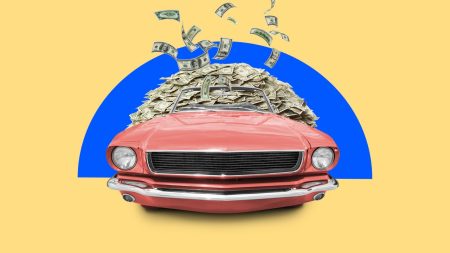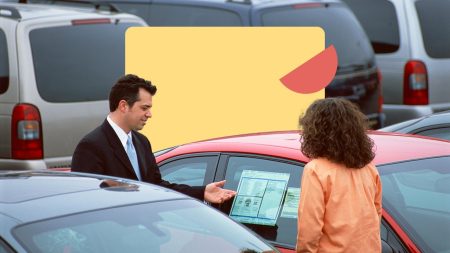Key takeaways
- A private party loan allows you to finance a vehicle purchased from a vehicle owner rather than a dealership.
- Private party auto loans are less common than other financing options and tend to have higher interest rates, but they can save you money because private sellers tend to list vehicles for less than a dealership is willing to accept.
- If you cannot find a private party loan that fits your needs, consider personal loans, dealership loans or buying in cash.
If you have found your dream car outside a dealership but can’t pay cash, securing a private party loan is the right next step, largely because of their flexibility. Rather than being limited to what a dealership offers, you can get the vehicle you want from a private owner at a price you can afford.
Private party loans can be easier to qualify for than traditional loans. However, lenders may charge more because buying from an individual is considered riskier than buying from a dealer. Despite the higher cost associated with private party auto loans, there are ways to find lenders that offer auto loans you can afford.
What is a private party auto loan?
A private party auto loan lets you finance a vehicle sold by the owner, not a dealer. Buying from an individual often means paying less for the car itself. Since they come with more risk to the lender, private party loans are not as widely available as other auto loans — and often, they have higher interest rates. Unlike many traditional loans, private party auto loans require you to provide vehicle info when you apply.
“Because of the nature of private party sales, rates tend to be higher than you would see if you went to a dealership,” says Strati Papageorge, senior vice president of auto product management for PNC Bank. “But the trade-off for customers is generally a lower vehicle price, so they can still have an affordable payment.”
There are ways to mitigate the drawbacks associated with private party auto loans and to find a lender that will offer an auto loan you can afford. Start by exploring your local banks and credit unions, then expand your search to online lenders. This way, you can compare potential loan terms before — or after — you have a vehicle in mind.
Where to find private party auto loans
Most large financial institutions — like community banks, local credit unions and online lenders — offer private party auto loans. Like any used auto loan, the vehicle you want to purchase will need to meet certain criteria. For instance, lenders typically require the car to be under 10 years old with fewer than 100,000 miles.
Other lenders may have a minimum loan amount. If the vehicle you want is $6,000, but the lender doesn’t offer loans that small, you will have to find another lender. Carefully review the lender’s criteria before applying for a private party auto loan to avoid taking a hit to your credit for a loan you don’t qualify for.
Bankrate’s view
While myAutoLoan isn’t a direct lender, the lenders in its online loan marketplace offer private party auto loans of $8,000 and up. The lenders in its network stand out for their flexible approval standards and quick funding.
Pros
- Flexible qualification criteria for borrowers.
- Quick funding.
- Transparent rates.
Cons
- Not available in all states.
- Some vehicle restrictions.
- Steep minimum loan amount.
Bankrate’s view
Regions Bank offers private party auto loans of $5,000 to $125,000. You can finance up to 110 percent of the vehicle’s value, and its maximum APR is competitive and low compared to other lenders on the market. In addition, it offers an autopay discount — something many online lenders don’t have.
Pros
- Large maximum loan amount.
- Rate discount when enrolled in autopay.
- Transparent rates.
Cons
- Not available in all states.
- Restrictions when buying used vehicles.
- No prequalification process.
Bankrate’s view
M&T Bank is based in Buffalo and may be a good choice if you want to purchase a less expensive vehicle. Private party auto loans are available for as little as $2,000. It also offers 24-hour customer service and competitive rates that max out under 16 percent.
Pros
- Low minimum loan amounts.
- Transparent rates.
- Discounts for existing M&T Bank customers.
Cons
- Not available in all states.
- No prequalification option.
- Long terms required for lowest rates.
Bankrate’s view
You can borrow up to $100,000 and receive funding in as little as one day. It also has a vast branch footprint, which is great for those who prefer in-person support. However, it has one of the highest minimum loan amounts and a high maximum APR, which can make your auto loan expensive if you don’t plan around the monthly payments.
Pros
- Low starting APR.
- Rate discounts for automatic payments.
- Loan decisions within minutes.
Cons
- High minimum loan amount.
- Must visit a branch for private seller purchase loans.
- Unclear eligibility requirements.
How to apply for a private party auto loan
Your budget and the local availability of used cars will be the biggest factors to consider. Fortunately, the actual financing process is similar to shopping for a new or used car at a dealership.
1. Create a budget
To create your budget, start with your credit history and compare auto loan rates. This will help guide you toward loans you qualify for and help you determine how much you are able to borrow. Once you know the state of your credit, it will be easier to calculate your monthly payment, decide how much you can pay out of pocket and determine how much you will need to finance.
2. Compare lenders
Once you know what vehicle you intend to purchase, shop for prospective lenders that offer private party auto loans. Compare interest rates, loan terms, monthly payments and potential fees. Because private party loans are typically more expensive, apply for preapproval before shopping. This way, you will have a firm idea of what you can spend — and what you can expect to pay each month.
3. Choose a vehicle
Check the cost-to-own estimates from trusted sources like Edmunds and Kelley Blue Book. These can help guide you toward a reliable car. You may be able to use a national website to find the right car, but traveling for a test drive and purchase — and dealing with out-of-state title transfers — may be more trouble than the car is worth. When you’re ready to buy from a private seller, review your state’s laws on title transfers. These should be available on your state’s Department of Motor Vehicles website.
4. Apply for a loan
After you find the vehicle you want to buy from a private owner, be prepared to provide a lender with basic personal details, including:
- Your full name, date of birth, address, Social Security number and contact information.
- Employment and income information.
- Current debt obligations, such as a mortgage.
You should also have certain documents and details about the vehicle you want to buy, including:
- Make and model, model year and mileage.
- The vehicle identification number, or VIN.
- Bill of sale that details the purchase agreement.
- Copy of the vehicle registration.
- Copy of the vehicle title.
- A written payoff quote from the seller’s lender, if applicable.
5. Finalize the deal
If you did not receive approval or can’t find a private party auto loan that fits the car you want to buy, there are alternatives. Personal loans and paying in cash are the most accessible options, but if all else fails, you can still shop for used cars at a dealership.
Your lender will provide payment due dates and an amortization schedule, which tells you how much money will go to interest and principal each month. If you can, opt for autopay.
This is a great way to ensure you pay on time without sending a check or constantly logging in to an online portal. Just be sure to check that payments have gone through each month.
Alternatives to private party auto loans
If you did not receive approval or can’t find a private party auto loan that fits the car you want to buy, there are alternatives.
Personal loans
The best alternative to a private party auto loan is a personal loan for car purchases. With unsecured personal loans, the lender considers your income and credit score to determine your eligibility. The vehicle won’t play a role in an approval decision.
This may be a good option if:
- You can’t find a small-enough private party loan.
- The vehicle you want to buy is too old or has too many miles on it.
- The vehicle is being purchased with a salvage title.
While a personal loan can allow you to purchase the vehicle you want, it will likely carry a higher interest rate than a private party auto loan.
Pay with cash
If you are not in a rush or haven’t found the right vehicle, keep building your savings. The more you can put toward a car, the less money you will spend overall. And if you are looking at older, cheaper models that wouldn’t qualify for a traditional loan, you won’t need to take on extra risk by financing your car with a personal loan.
Dealership loans
If you’ve been rejected for a private auto loan, it might be time to visit dealerships instead. See if you qualify for in-house financing offered by a dealer. Dealers may have higher prices than private sellers, but getting a loan is much simpler. You may also qualify for a used auto loan with a lender that previously rejected you for a private loan.
Bottom line
Private party auto loans are a quick, relatively pain-free way to buy outside a dealership. They aren’t as common, but you can still find competitive options from various lenders. And since sale prices for private purchases are lower than those at a dealership, you may be able to save money.
Read the full article here









